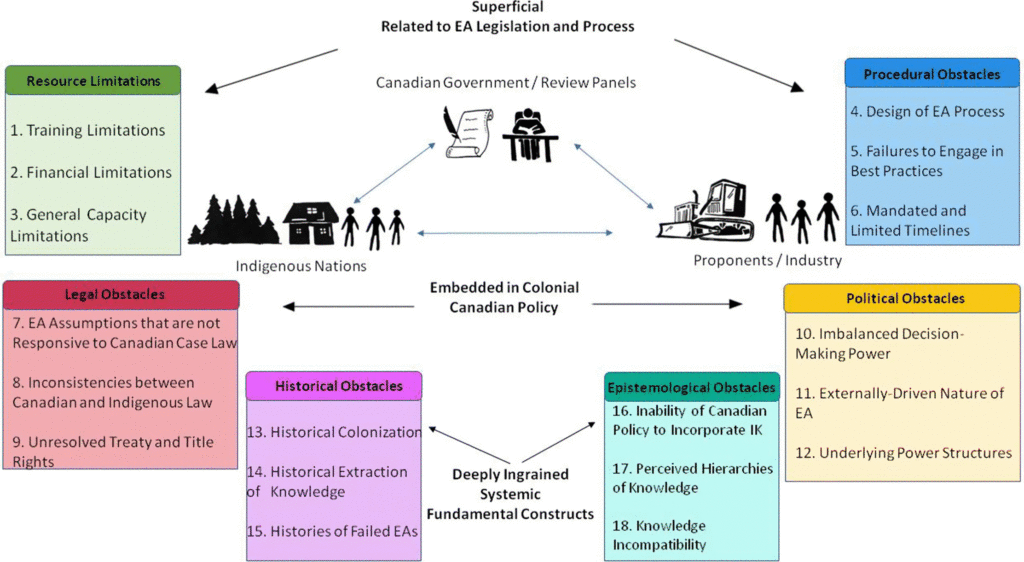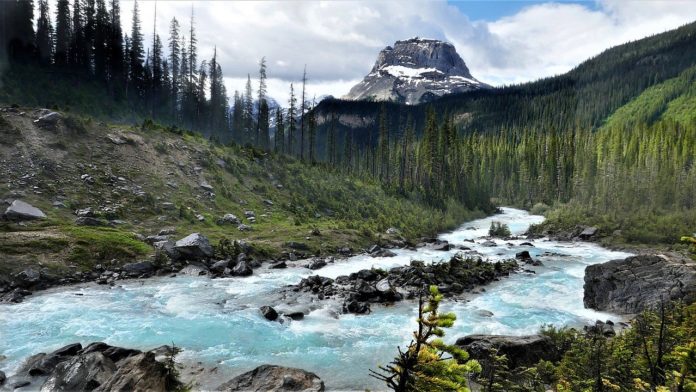In recent years, the Canadian government has strengthened its commitment to fighting the ongoing climate crisis. And while this has involved increased consultations with diverse knowledge-holders across the country, a recent study from the University of Victoria has shown that policymakers may be missing out on a crucial source of environmental expertise: Indigenous knowledge that has been informing decisions about environmental management for millenia.
The study was led by Lauren Eckert, a PhD candidate and Raincoast Conservation Foundation fellow, and published in Facets.
The importance of engaging with Indigenous knowledge
Environmental assessment processes are used by governments around the world to make key decisions that relate to the environment. Typically, this involves synthesizing knowledge from a wide range of fields to predict and evaluate the ecological, social, health, and economic impacts of proposed developments, activities, and strategic undertakings.
But environmental assessments are often criticized for not incorporating the best environmental knowledge available, or neglecting the needs of all communities that their decisions may impact.
One particular area of neglect revolves around Indigenous knowledge. Policymakers in Canada are increasingly becoming aware of how Indigenous knowledge can complement western science, but critics of recent environmental assessments have pointed out that these policymakers haven’t meaningfully engaged with Indigenous knowledge when compiling their assessments.
“Environmental assessment processes have the potential to generate environmentally sound, socially equitable decisions across Canada,” Eckert explained. “But without fundamental shifts in the way current policy relates to, engages with, and recognizes the rights of Indigenous Peoples and their knowledge, outcomes may continue to generate conflict between federal and Indigenous governments.”
To determine how governments could more meaningfully learn from Indigenous knowledge in future environmental assessments, Eckert and her colleagues performed a systematic literature review of the intersections between Indigenous knowledge and Canadian environmental assessments.
Their goal was to identify gaps in the methods used in environmental assessments, and create a list of recommendations as to how the Canadian government could better engage with Indigenous Peoples in the future.
Of the 19 papers that matched their search criteria, not a single one showed a positive and adequate relationship between Canadian environmental assessments and Indigenous knowledge. Instead, the papers identified obstacles that have plagued environmental assessments in the past.
Eckert and her colleagues divided these into six main areas: resource limitations, legal obstacles, historical obstacles, epistemological obstacles, political obstacles, and procedural obstacles.

For example, Eckert explained how the problematic perception that western scientific knowledge is superior to Indigenous knowledge has prevented the Canadian government from meaningfully interacting with Indigenous knowledge holders in past assessments.
As another example, inconsistencies between Canadian and Indigenous law have also made it difficult to integrate Indigenous knowledge into environmental assessments.
Recommendations for the road ahead
Although many of these obstacles may seem insurmountable, Eckert and her collaborators put together a series of recommendations for Canadian policymakers leading future environmental assessments.
Among these recommendations were granting greater Indigenous power in decision-making processes, as well as explicitly recognizing land and treaty rights.
“Ultimately, we recommend that Canada’s legislative and federal structures recognize Indigenous-led environmental assessments,” Eckert said.
“A number of examples of these processes exist, and it is through these approaches — led by Indigenous Nations, for Indigenous Nations — that there can be opportunity for equitable knowledge and power-sharing.”
Eckert and her collaborators also looked at the recently-passed Impact Assessment Act, which aims to provide Canadian policymakers with updated guidelines for carrying out environmental and other assessments. They found that while the Act does make strides towards a more equitable integration of Indigenous knowledge, many obstacles remain present.
“The new act mandates the inclusion of Indigenous knowledge in environmental assessment at the federal level,” Eckert explained. “However, many deep-rooted obstacles still exist. These include the on-going impacts of colonization and the exclusion of Indigenous Peoples from decision-making processes.”
Overall, Eckert believes that good can come out of environmental assessments — as long as policymakers take the time to properly address all of the obstacles they may face.
“Environmental assessment processes are an opportunity for Canada to fulfill their reconciliation agenda while likewise engaging in well-informed environmental decision making.”








































